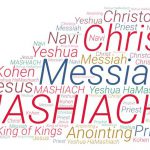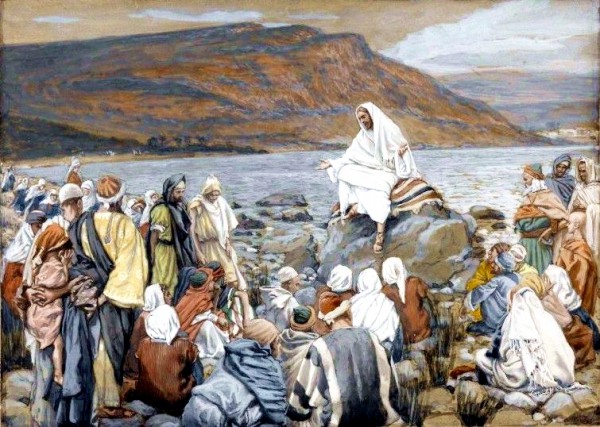
Yeshua Teaches People by the Sea, by James Tissot
Moses told the Israelites: “‘The Lord your God will raise up for you a prophet like me from among you, from your fellow Israelites. You must listen to him.’” (Deuteronomy 18:15)
Yeshua (Jesus) was rejected by most of the Jewish people because of His claims to be the son of God.
Now, 2,000 years later, just about all of the Jewish community rejects Yeshua as the Jewish Messiah. However, some say that He was a good rabbi and maybe even a prophet.
In Biblical times, some prophets could perform miracles and some could accurately foretell future events.
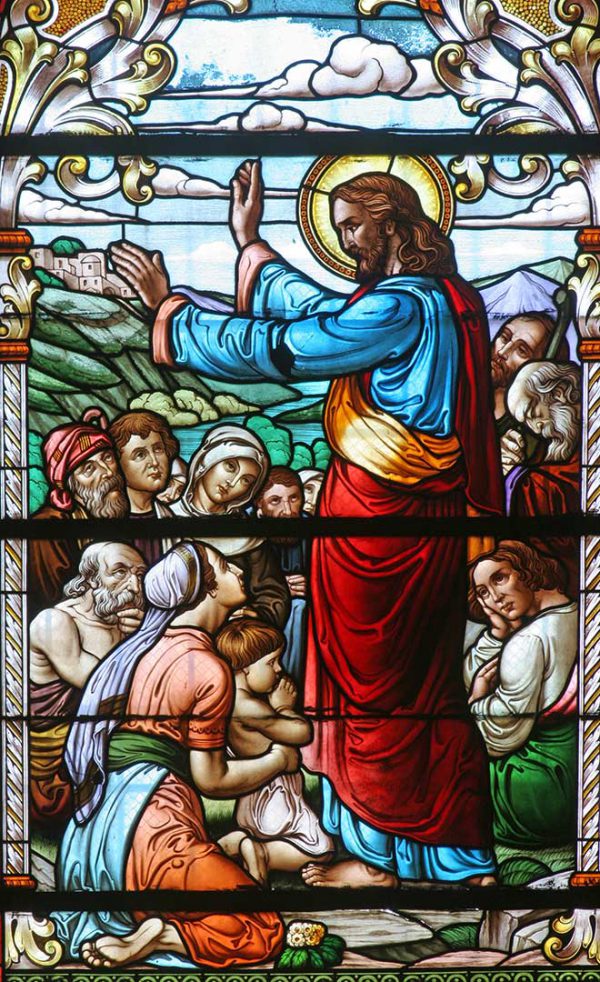
Sermon on the Mount in stained glass (location unknown)
All of them, however, were able to receive messages from God about the current situation at hand and speak it forth to the people. They were, in effect, God’s mouthpieces.
Some of these people were reluctant takers of the role but turned out to be highly significant, including Moses, Jeremiah, and Jonah.
Two-thirds of the Tanakh (Hebrew Scriptures) consists of The Prophets.
The rest of the Holy Tanakh is comprised of The Torah (first five books) and The Writings such as Psalms or Chronicles.
Like Moses, some of the prophets pointed the people of Israel to a greater prophet to come — and we believe this is Yeshua.
A Prophet from Among You
Moses was the most significant Jewish prophet in the Tanakh.
He was God’s chosen mouthpiece and mediator who delivered the Israelites from Egyptian slavery. This story is recalled throughout the Bible and remembered each year as Jews celebrate Passover (Pesach) and Feast of Tabernacles (Sukkot).
The Exodus was a redemptive event that prophetically pointed toward a greater future redemption secured by an even greater Jewish prophet.
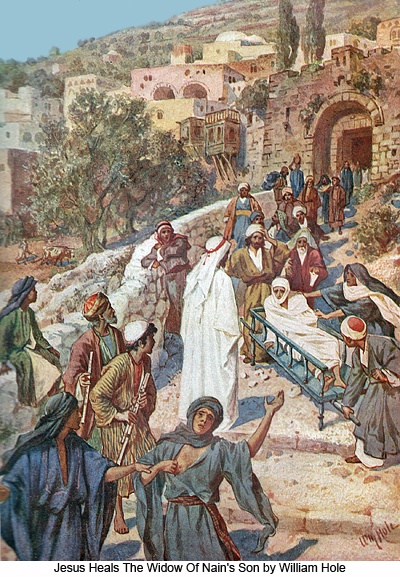
Yeshua Raises the Widow’s Son, by William Hole
And Moses makes it clear that this prophet would be one of the Jewish People, one of his “brothers,” just as later prophets foretold, such as Zechariah 6:10–13 and Micah 5:2.
These prophecies of Zechariah and Micah were later verified when the Jerusalem crowds identified Yeshua (Jesus) as “Yeshua the prophet from Nazareth in Galilee” (Matthew 21:11).
And that wasn’t the first time the people said this.
After Yeshua raised a widow’s son, the people hailed Him as a prophet:
“They were all filled with awe and praised God. ‘A great prophet has appeared among us,’ they said. ‘God has come to help His people.’” (Luke 7:16)
Yeshua even referred to Himself as a prophet when He said, “A prophet is not without honor except in his own town, among his relatives and in his own home” (Mark 6:4).
He also said, “In any case, I must press on today and tomorrow and the next day—for surely no prophet can die outside Jerusalem!” (Luke 13:33)
He said this because prophets had a long history of being killed by the people in Jerusalem.
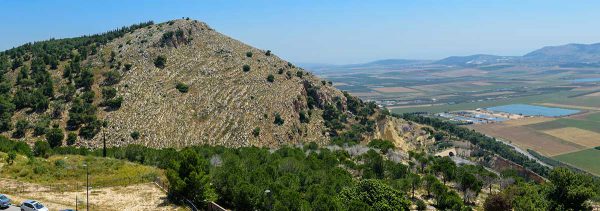
Mount Precipice is a 397-meter-high steeply sloped mountain near Nazareth overlooking the Jezreel Valley. It could be the mountain from which the local Nazarenes tried to throw Yeshua to His death, but He escaped them (Luke 4:29).
Why Was Yeshua Called a Prophet?
Have you ever noticed that Yeshua never used the prophetic phrase, “Thus says the Lord!”
He didn’t need to — He always spoke as one with the Father (John 8:28, 12:49).
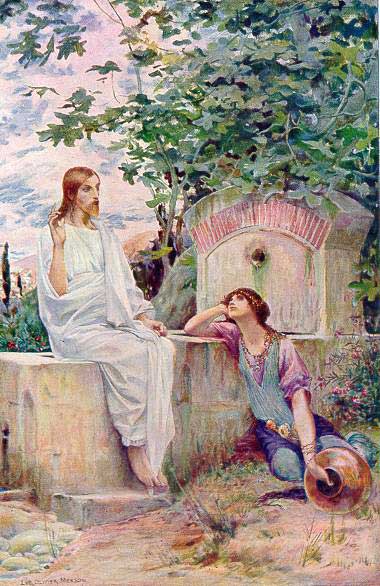
Jesus at the Well (1910), by Luc-Olivier Merson
The mere human closeness to God that other prophets had cannot replace someone who is one in being with God, as the Jewish Apostle John explains:
“In the beginning was the Word, and the Word was with God, and the Word was God.” (John 1:1)
Therefore, the Messiah spoke the words of God with perfect understanding and authority.
He explained to His disciples:
“For I did not speak on My own, but the Father who sent Me commanded Me to say all that I have spoken.” (John 12:49; see also John 7:16 and 14:24)
The Greatest Authority
God’s appointed Hebrew prophets were given an amount of authority according to their calling and mandate.
Elijah, for instance, had great authority through prayer to bring life back to a boy who was dead and to bring fire down from heaven in front of hundreds of false prophets (1 Kings 17:17-24, 18:34–38).
The Messiah, however, exercised an authority that people had not seen before in the history of Israel: He healed a man born blind and raised a man who had been dead for four days.
He not only demonstrated divine authority in His miracles, He also exuded authority in His voice and presence:
“They went to Capernaum, and when the Sabbath came, Yeshua went into the synagogue and began to teach. The people were amazed at His teaching because He taught them as one who had authority, not as the teachers of the law.” (Mark 1:21–22)
The writer of the letter to the Hebrews explains the source of Yeshua’s authority this way:
“Moses was faithful as a servant in all God’s house, bearing witness to what would be spoken by God in the future. But Messiah is faithful as the Son over God’s house.” (Hebrews 3:3–6)
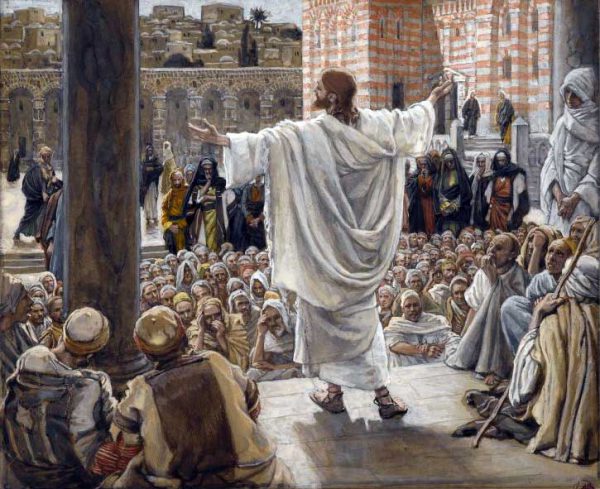
Jerusalem, Jerusalem, by James Tissot
Listen to Him!
Moses told the people that they must listen to the future prophet (Deuteronomy 18:15).
These words were echoed by God Himself when Yeshua appeared transfigured, displaying His glory.
Standing with the great prophets Moses and Elijah, “a voice came from the cloud, saying, ‘This is my Son, whom I have chosen; listen to him.’” (Luke 9:35)
What would happen if someone didn’t listen to Him? God told Moses:
“I will hold accountable anyone who does not listen to My words that that prophet speaks in My name.” (Deuteronomy 18:18-19)
The Messiah is God in the flesh who died for our sins, and the Good News is that everyone who repents of their sins, turns to God, and listens to Yeshua — enters His Kingdom forgiven.
This is why the greatest prophetic utterance Yeshua made everywhere He went was this:
“The time is fulfilled, and the kingdom of God is at hand; repent and believe in the gospel.” (Mark 1:15)

To repent in Hebrew is teshuvah, which also means to return or turn back to God.
A Prophet Like Me
Moses said this greater prophet would be like himself (Deuteronomy 18:15).
Here are just a few ways Yeshua and Moses were similar:
Both spent time in Egypt as children hiding from the government leaders who had issued death decrees on baby boys, which would have killed both Moses and Yeshua.
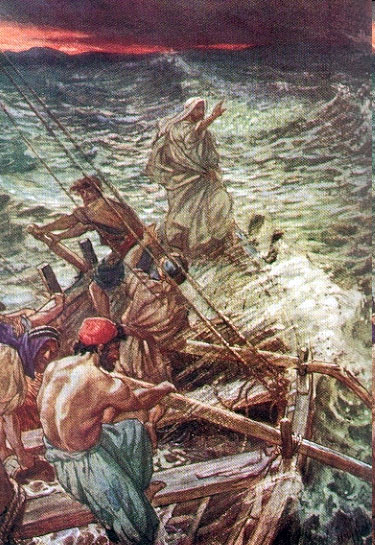
Yeshua Calms the Storm on the Sea of Galilee (1908), by William Hole
Both delivered Israel from slavery: Moses delivered his People from physical bondage in Egypt; Yeshua from spiritual bondage of sin.
Both performed miracles (something not all prophets did). Even the forces of nature changed their course at their command. Moses parted the Red Sea. Yeshua calmed a storm.
Moses sent 12 spies to explore Canaan. Yeshua sent 12 apostles to reach the world.
Moses’ brother Aaron became the High Priest for the new nation of Israel in the wilderness. Yeshua’s brother Yaacov (James), became the leader of the first Jewish Believers and congregation in Jerusalem.
Moses appointed 70 rulers over Israel. Yeshua anointed 70 disciples to teach the nations.
Moses mediated the First (Old) Covenant between God and the People; Yeshua was and is the mediator of the New Covenant.
Greater Than Moses
While both Moses and Yeshua shared these similarities, Yeshua is clearly greater. We see this when it comes to covenants.
Although God’s Mosaic laws in the First (Old) Covenant are perfect, God had a greater plan to provide for the Jewish People and for the whole world the means to keep His laws, through a New Covenant.
“‘This is the covenant which I will make with the house of Israel after those days,’ declares YHVH (the Lord), ‘I will put My law within them and on their heart I will write it; and I will be their God, and they shall be My people. …
‘For I will forgive their iniquity, and their sin I will remember no more.’” (Jeremiah 31:31-34)
Through the sacrifice of Yeshua as the prophesied guilt offering (Isaiah 53:10), He made it possible for our iniquity and sin to be remembered no more.
He was and is the eternal prophetic voice of God to humanity.
Let us listen to Him.







